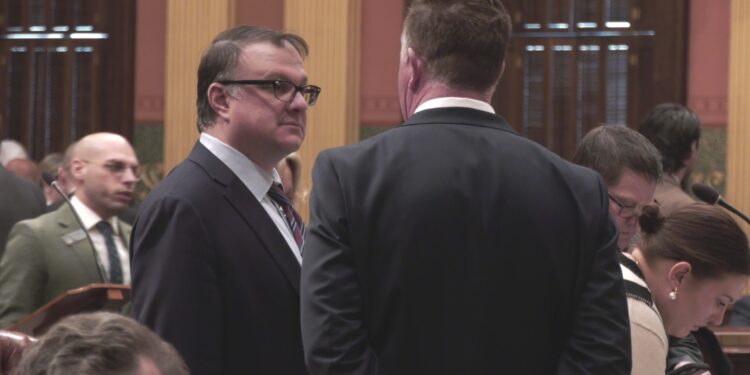LANSING, Mich. (WZMQ) – With less than two months before the start of the new fiscal year, Michigan lawmakers are still without a finalized state budget, and House Speaker Matt Hall isn’t offering a timeline for when a deal might come together.
On Wednesday, Hall (R-Richland Twp.) declined to confirm whether negotiations are actively progressing, saying instead that Democrats are basing their proposals on outdated estimates and need to come back to the table with “a real situation” in mind.
“I’ve encouraged them, why don’t you go back and develop a budget that’s based on the real situation, so we can negotiate,” Hall said.
He claims House Republicans are relying on the most recent analysis from the nonpartisan House Fiscal Agency, which estimates a $600-700 million revenue hit, primarily from tax changes and overpayments in programs like SNAP and Medicaid. Hall criticized the Senate Fiscal Agency’s collaboration with the Citizens Research Council, saying their estimates rely on the state not receiving a federal Medicaid waiver, which he argues inflates the size of the deficit.
Hall says he supports Governor Gretchen Whitmer’s request for a Medicaid waiver that would allow Michigan to continue collecting a health care provider tax and draw down more federal funding, but maintains it’s not a dealbreaker.
“If we don’t get the waiver, we can do all of our priorities in the budget,” Hall said. “There’s so much waste, fraud and abuse in this state budget.”
The Speaker repeated Republican criticism of the state’s Medicaid system, particularly the “Hospital Assessment” tax, calling it a “scam” designed to game the federal match formula. He defended potential cost-saving reforms, saying that in some cases, Healthy Michigan Plan recipients are receiving better benefits than those with private insurance.
“We can look at what are the benefits that we’re offering, and are those benefits in line with what other people get in their health insurance,” Hall said.
Beyond Medicaid, Hall emphasized other GOP priorities for the upcoming budget: no new taxes, record investments in roads and education, and targeted tax cuts, including eliminating taxes on tips, overtime, and Social Security income.
As for the holdup in negotiations, Hall pointed to what he sees as disorganization within the Democratic caucus. He says Republicans are united behind a single plan, while Democratic leaders in the House and Senate have failed to align behind Whitmer.
“I think the Democrats would be best served to iron out their differences, empower Governor Whitmer to lead, and we’ll get a budget done very fast,” Hall said.
Last month, Hall removed Rep. Alabas Farhat, the Democratic vice chair of the House Appropriations Committee, from his role, citing a breakdown in budget collaboration. Since then, public updates on talks between legislative leaders have been few and far between.
Despite the delays, Hall said he’s still aiming for a bipartisan agreement by the September 30 deadline, but gave no clear answer on how often the budget leaders are meeting to continue negotiating. Lawmakers are expected to return to session later this month.










